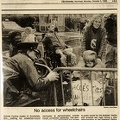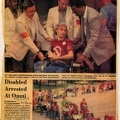The Handicapped Coloradan October issue/Vol. 11, No. 4
PHOTO: A waist up shot of Mike Auberger in a sweater in his wheelchair with his chest strap. His face has it's customary stern look. Caption reads: Mike Auberger.
Title: APTA still says no to lifts
Wheelchair activists cross into Canada
Wheelchair militants chased their arch enemy over the border into Canada in October, but unfortunately for advocates of accessible transit systems, the American Public Transit Association (APTA) not only came back but found time in between dodging wheelchair barricades and attending panel discussions to veto mandatory lifts on buses.
APTA's board of directors voted unanimously at their national convention in Montreal to reaffirm its policy of local option while continuing to study proposals made by its Elderly and Disabled Services Task Force. APTA has been fighting mandatory lifts since the Carter administrations' Department of Transportation (DOT) first ordered transit companies to install lifts in 1979. APTA lost in U.S. District Court in 1980 but won in 1981 when the U.S. Court of Appeals ruIed that the DOT regulations were not required by Section 504 of the Rehabilitation Act of 1973.
In 1983 wheelchair activists in Denver formed the American Disabled for Accessible Public Transit (ADAPT) and picketed APTA's national convention being held in Denver. ADAPT chapters rapidly sprang up in other cities, and APTA delegates soon grew used to having their annual conventions and regional meetings disrupted by hundreds of demonstrators in wheelchairs.
This year's meeting in Montreal was no different.
As usual, local police threw up barricades in front of the conventioneers' hotels, and as usual, wheelchair demonstrators hurled their chairs and bodies at police lines.
And, as usual, they were arrested. "City police crush wheelchair protest," headlined the Montreal Daily News, next to a picture of police removing demonstrators from their chairs and passing them over the barricades.
Protester Lori Taylor said the police had no right to take her husband's chair away from him. "They separated him from his legs," she said. "He can't walk, he's just sitting on the wet ground and all he wants to do is ride a bus like you and me."
Police maintained that they had a right to remove Lester Taylor any way they could after he deliberately crashed his way through a metal barrier in front of the Queen Elizabeth Hotel.
Taylor was taken into custody, along with 24 other demonstrators. Many of those arrested were from Colorado, including Mike Auberger, who chained his wheelchair to a handrail in the hotel lobby.
Also among those "arrested" was a seven-year-old-girl from Scottsdale, Ariz. Jennifer Keelan, who has cerebral palsy, was taken into custody along with her mother Cynthia. Both mother and daughter were released later that day without charges being filed against them so that they would not be separated overnight.
Cynthia Keelan said the police lifted Jennifer and her chair onto a police van using the kind of lift she and Jennifer would like to see put on every bus. She said she was very proud of her "very, very brave little girl," although a police spokesperson was quick to point out that it was the mother, not the daughter, who was actually being arrested.
Most of those arrested were U.S. citizens, although a few Canadians did join the pickets. Maria Barila, a Montreal resident who was arrested, said potential Canadian demonstrators had been warned by one government agency that they could lose their welfare checks if they were arrested.
Montreal police had received reports from the six U.S. cities in which ADAPT had previously picketed APTA conventions and had prepared accordingly, down to issuing officers kneepads in case wheelchair militants attempted to run their chairs into police.
Perhaps in an effort to cut down on ... Continued on p.2 [Unfortunately we don't currently have the second part of this article. If you have it and can send a picture we would be very grateful. ]
Second article:
RTD firm in commitment to accessibility
RTD has been named one of the nation's most accessible public transit systems by the American Disabled for Accessible public Transit (ADAPT), and it continues to show every sign of improving that system.
On Nov. 1, RTD became one of the first transit systems in the country to offer accessible public transportation on intercity routes when 35 lift-equipped buses began rolling between Boulder and Denver. The Neoplan buses replace Yellow Cab service.
Critics of lifts on intercity buses argued that they were too costly and took up to much space on already crowded buses, but when Neoplan submitted its bid to RTD, the cost was so low that the transit agency was able to buy additional buses.
RTD says its new regional service shouldn't cause any delays, since its buses are already operating at a 95 per cent on-time rate.
The lift-equipped buses operate between Boulder, Broomfield Park-n-Ride, Market Street Station, Stapleton Airport. and Longmont.
Regular fares on the Regional AFB arc: Boulder to Broomfield, $1.25; Broomfield Park-n-Ride to Denver, $1.25; Boulder-Denver-Stapleton, $2.00. The fare for disabled individuals traveling during off-peak hours (9 a.m. to 4 p.m.) is 104. Regular monthly passes are $68; disabled riders pay $44 with their RTD Handicapped I.D. card. Ten-ride coupons are also available for this service at a cost of $18.
For additional information regarding the new accessible regional service or for trip planning needs, call 777-3343 until 10 p.m.
RTD also announced a get-tough policy on non-function lifts on buses being operated by private contractors. Some buses on accessible routes are now operated by private companies, even though the drivers still wear RTD uniforms and the buses carry the RTD logo.
Every time one of those buses gets stopped and its lift isn't working, RTD will automatically levy a $100 fine against the private transit provider.
Inset sidebar: Accessible systems
10 BEST
• New York City Transit Authority (bus only)
• Washington (D.C.) Metro Area Transit Authority (Metrorail)
• Municipality of Metropolitan Seattle
• San Francisco Municipal Railway
• Alameda-Contra Costa County Transit District (Oakland, Calif.)
• Regional Transportation District (Denver, Colo.)
• Transit District (Eugene, Ore.)
• Santa Clara County Transit District (San Jose, Calif.)
• Tri-County Metropolitan Transportation (Portland, Ore.)
• Southeastern Michigan Transportation Authority (Suburban Detroit)
HONORABLE MENTION
• Niagara Frontier Transit (light rail system only) (Buffalo, NY)
• Golden Gate Bridge Highway & Transit District (San Rafael, Calif.)
• Miami Valley Regional Transit Authority (Dayton, Ohio)
• Sacramento Regional Transit District (Sacramento, Calif.)
• Cambria County Transit Authority (Johnstown, PA)
10 WORST
• Chicago Transit Authority
• Southeastern Pennsylvania Transit Authority (Philadelphia)
• Massachusetts Bay Transportation Authority (Boston)
• Metropolitan Transit Commission (Minneapolis, Minn.)
• Metro Transit Authority of Harris County (Houston, Tex.)
• Detroit Department of Transportation
• Port Authority of Allegheny County (Pittsburgh, PA)
• Mass Transit Administration of Maryland (Baltimore)
• Greater Cleveland Regional Transit Authority
• Bi-State Development Agency (St. Louis, MO) DISHONORABLE MENTION
• Washington (D.C.) Metro Area Transit Authority (Metrobus)
• VIA Metropolitan Transit (San Antonio, Tex.)
• City & County of Honolulu
• Regional Transit Authority (New Orleans)
• Queen City Metro (Cincinnati, Ohio)
- Author
- Handicapped Coloradan
- Created on
- Thursday 11 July 2013
- Posted on
- Thursday 18 January 2018
- Tags
- 1979, 1983, ADAPT - American Disabled for Accessible Public Transit, APTA Board of Directors, APTA Elderly and Disabled Services Task Force, Canada, Carter Administration, Cynthia Keelan, Denver RTD, DOT - Dept of Transportation, ET Ernest Taylor, federal court case, intimidation, Jennifer Keelan, local people with disabilities, Lori Eastwood, Maria Barille, Mike Auberger, no to lifts, police barricades, Rehabilitation Act of 1973 - section 504, special police training, take away wheelchairs
- Albums
- Visits
- 1469
- Rating score
- no rate
- Rate this photo


0 comments